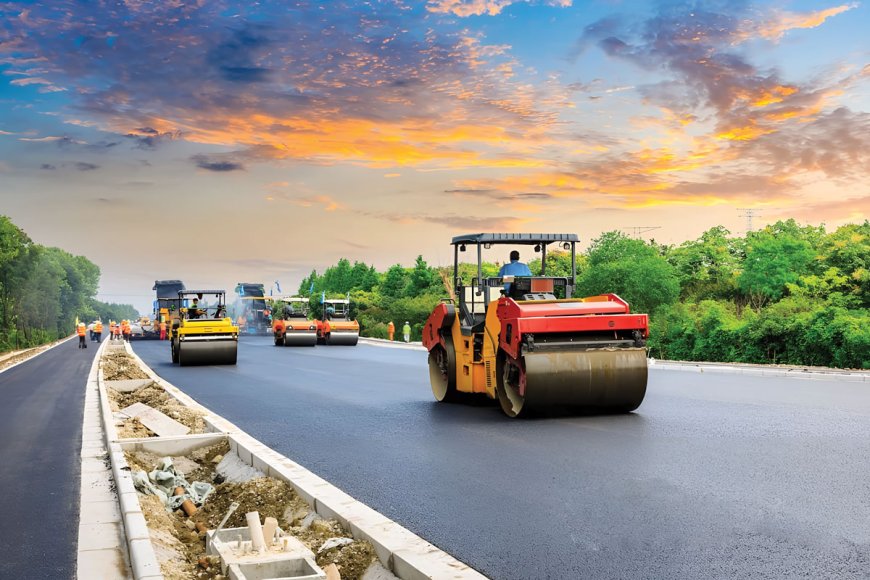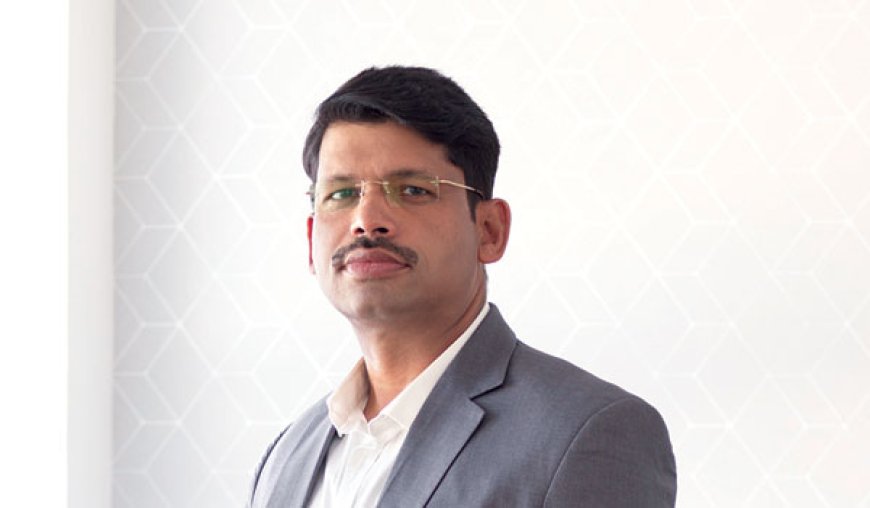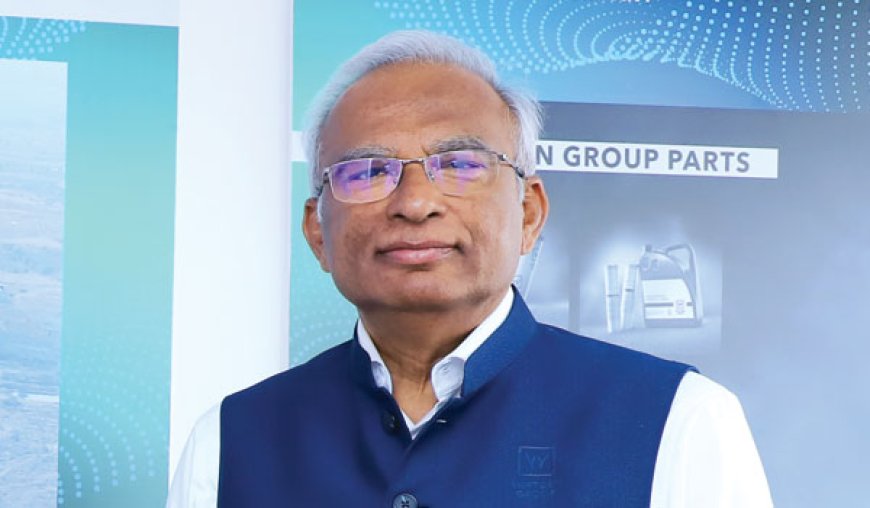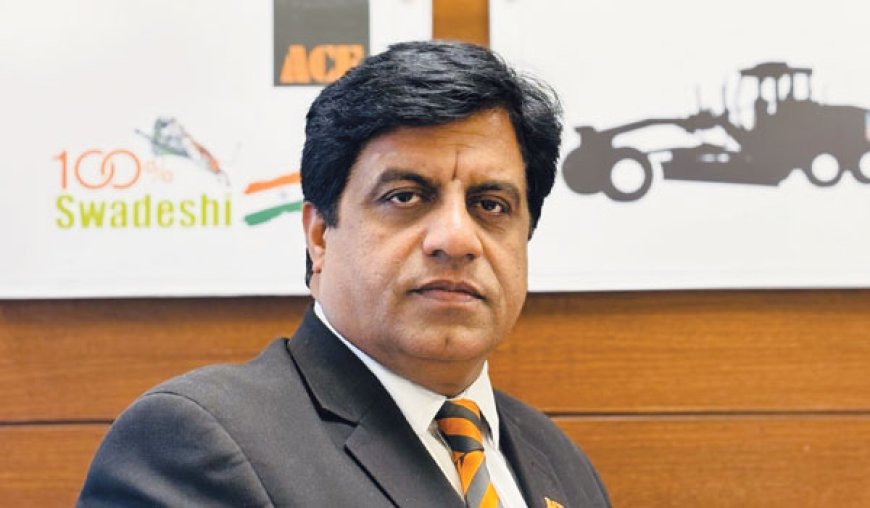PERFORMANCE REDEFINED Unlocking the True Potential of Road Construction Equipment
The Indian infrastructure sector is on an unprecedented growth trajectory, with massive investments directed toward highway expansions, rural road development, and expressway projects.

The Indian infrastructure sector is on an unprecedented growth trajectory, with massive investments directed toward highway expansions, rural road development, and expressway projects. In this dynamic environment, the performance of road construction equipment — such as asphalt pavers, compactors, motor graders, milling machines, and soil stabilisers — becomes critical. However, in an era demanding faster completion timelines, stringent quality standards, and environmental responsibility, optimising road equipment performance is no longer optional; it is essential, explores Equipment Times.
Road construction today is not just about building stretches of asphalt; it’s about creating durable, sustainable infrastructure. As project demands intensify, OEMs, contractors, and rental fleet owners are sharpening their focus on performance factors like equipment uptime, fuel efficiency, operator productivity, and technological integration.
“Efficiency is not merely about speed. It’s about the smart utilisation of equipment for delivering quality within deadlines and budgets,” says an industry veteran from a leading equipment manufacturer.
Market for Road Construction Equipment
The market for road construction equipment in India is experiencing robust growth, currently estimated to be worth between USD 3.5 and 4 billion in 2025. Driven by major government infrastructure programs like Bharatmala Pariyojana, PM Gati Shakti, and intensified focus on rural and state highway development, the sector is growing at a steady pace of around 8–10% CAGR. The government’s commitment to expanding multi-modal connectivity, building expressways, greenfield corridors, and enhancing rural road networks under schemes like the Pradhan Mantri Gram Sadak Yojana (PMGSY) continues to fuel strong demand for modern road-building equipment.
Key drivers of the market include the massive infrastructure spending announced in the Union Budget 2025, amounting to Rs 11.11 lakh crore, and the growing role of public-private partnerships (PPPs) through models like BOT (Build-Operate-Transfer) and HAM (Hybrid Annuity Model). There is also a noticeable shift towards technology adoption, with contractors increasingly seeking automated, fuel-efficient, GPS-integrated machines. Rapid urbanization, the growth of smart cities, and metro rail expansions are further boosting demand for quality road construction equipment across urban and semi-urban areas.
The primary equipment categories witnessing high demand include asphalt and concrete pavers, soil and tandem compactors, pneumatic tyred rollers, motor graders, cold milling machines, asphalt plants, and versatile machines like backhoe loaders and skid steer loaders. Particularly, sensor-based pavers, IoT-enabled compactors, and GPS-guided graders are gaining traction among large contractors and fleet owners.
Emerging market trends indicate a growing preference for smart equipment fitted with machine control technologies, telematics, and real-time performance monitoring systems. Although electric and hybrid equipment is still in the nascent stage, interest is rising steadily, with wider commercial adoption expected after 2027. Sustainability is becoming a key focus area, with a push towards machines that support recycled asphalt usage and have a lower carbon footprint. Additionally, the equipment rental market is growing as small and mid-sized contractors opt for renting instead of owning expensive machinery.
However, the market does face challenges. The high cost of advanced equipment limits penetration among small contractors, and there is an ongoing shortage of skilled operators and maintenance technicians. Funding delays occasionally impact project execution timelines, and despite growth in Tier I cities, aftermarket service support in Tier II and Tier III towns remains inadequate.
Looking ahead, the market is poised for sustained growth over the next five years, with increasing demand for automation-ready, energy-efficient, and environmentally sustainable equipment. Localized manufacturing under India’s Production-Linked Incentive (PLI) schemes is expected to further strengthen the market. Additionally, the adoption of digital platforms for equipment purchase, rentals, and service support will play a significant role in shaping the industry’s future.
Key Strategies for Optimising Performance
Preventive Maintenance: The Foundation
A robust preventive maintenance programme is fundamental. Scheduled inspections, timely oil changes, regular calibration of sensors, and replacement of wear parts ensure that machines operate at peak levels. Preventive maintenance minimises unexpected breakdowns, extends machine life, and improves resale value — a critical factor in a price-sensitive market like India.
Many companies now use predictive maintenance technologies powered by telematics and IoT sensors that analyse machine data to forecast failures before they occur, reducing downtime dramatically.
Operator Training: The Human Factor
Even the most advanced machine cannot perform optimally without a skilled operator. Industry leaders are investing heavily in operator training programmes covering proper equipment handling, efficient work practices, machine diagnostics, and safety protocols.
Manufacturers are also offering simulator-based training modules that replicate real-world construction scenarios, helping operators enhance their skills without risking equipment or site safety.
Smart Telematics and Fleet Management
Telematics systems have transformed road equipment management. Real-time tracking of machine location, fuel consumption, engine health, and idle time helps site managers take corrective actions instantly. Fleet management software platforms allow data-driven decisions that optimise equipment allocation, reduce operational costs, and maximise productivity.
According to recent studies, companies using telematics witness up to 20–25% improvement in equipment utilisation rates and a 15–18% reduction in maintenance costs.
Equipment Selection: Fit for Purpose
Choosing the right equipment for the right job is crucial. Over-specifying a machine can result in underutilisation and higher fuel costs, while under-specifying leads to inefficiencies and frequent breakdowns. OEMs are advising clients on the most appropriate models based on project type, site conditions, output requirements, and budget constraints.
Additionally, the trend of using multi-functional machines — such as graders that double up as compactor substitutes in certain terrains — is gaining momentum, offering better return on investment.
Embracing Green Technologies
With stricter emission norms like CEV Stage IV for construction equipment coming into force, manufacturers are developing machines that are cleaner and more fuel-efficient. Hybrid drives, electronic fuel injection systems, and energy recovery systems are examples where green technology also results in better machine performance.
Innovations like warm-mix asphalt equipment and electric-powered pavers are no longer futuristic concepts but practical realities in India’s ambitious road building initiatives.
Challenges to Overcome
Despite these advances, challenges remain.
• High initial cost of advanced technologies
• Fragmented project execution models leading to poor equipment management
• Resistance to change among small and mid-sized contractors
However, as competition intensifies and sustainability becomes non-negotiable, stakeholders across the board realise that investing in performance optimisation today ensures project success tomorrow.
Future Outlook
The road construction equipment industry in India is set to witness a new era of intelligent, connected, and sustainable machinery. As AI, automation, and electrification gain ground, equipment performance optimisation will become a strategic differentiator for companies aiming to lead.
In this evolving landscape, the winners will be those who not only invest in superior machines but also in smarter operations, skilled manpower, and predictive technologies — creating roads that are not only built faster but are built to last.
Industry speaks…

Dimitrov Krishnan, Managing Director, Volvo CE India, said, “The Indian road construction equipment market is experiencing high growth, driven by substantial government investments and strategic infrastructure initiatives. The National Infrastructure Pipeline (NIP) and PM Gati Shakti Master Plan are pivotal in enhancing multi-modal connectivity, fostering demand for advanced construction machinery. In FY2024, equipment sales surged by 15–20%, reaching over 135,000 units, propelled by increased road construction activities and a projected ₹10 trillion capital expenditure. Additionally, the government’s commitment to sustainability is evident through the promotion of electric and hybrid construction equipment, supported by policies like the FAME scheme. These factors collectively underscore a dynamic market landscape for road construction equipment in India
Volvo CE offers a robust portfolio of road construction machinery tailored to the diverse demands of the Indian infrastructure sector. The lineup includes advanced asphalt compactors like the DD90C and DD100C, designed for flexible pavement applications with features such as improved visibility, efficient engines, and operator-friendly displays.”
 Ramesh Palagiri, MD & CEO, Wirtgen India, said, “There is a slight dip in demand in road sector due to low award of projects, which has affected the new machine sales. But this is not a dramatic dip but a marginal drop in sales. We expect this to pick up after monsoon. With its innovative, high-performance and cost-efficient products and technologies for cold milling, soil stabilization, hot and cold recycling, concrete paving and surface mining, WIRTGEN leads the world market in road and mineral technologies. All the machines offered by Wirtgen are equipped with Computer-assisted automated features which not only optimize operating processes and machine productivity but also improve operator performance. Intelligent information and diagnostic systems additionally support and relieve the operator, resulting in a faster and more efficient way of working. Wirtgen’s customer-oriented development expertise is a guarantee of innovations tailored to the needs of the market. Alongside machine efficiency and alternative applications and methods, digitization and connected system solutions are important drivers in the development of the overall road construction process chain. The Wirtgen Group has developed application-specific core technologies as well as digital solutions and technologies of tomorrow that which are already available for our customers.”
Ramesh Palagiri, MD & CEO, Wirtgen India, said, “There is a slight dip in demand in road sector due to low award of projects, which has affected the new machine sales. But this is not a dramatic dip but a marginal drop in sales. We expect this to pick up after monsoon. With its innovative, high-performance and cost-efficient products and technologies for cold milling, soil stabilization, hot and cold recycling, concrete paving and surface mining, WIRTGEN leads the world market in road and mineral technologies. All the machines offered by Wirtgen are equipped with Computer-assisted automated features which not only optimize operating processes and machine productivity but also improve operator performance. Intelligent information and diagnostic systems additionally support and relieve the operator, resulting in a faster and more efficient way of working. Wirtgen’s customer-oriented development expertise is a guarantee of innovations tailored to the needs of the market. Alongside machine efficiency and alternative applications and methods, digitization and connected system solutions are important drivers in the development of the overall road construction process chain. The Wirtgen Group has developed application-specific core technologies as well as digital solutions and technologies of tomorrow that which are already available for our customers.”
 Sunil Talreja, Vice President, Road Construction Equipment Division, ACE, said, “The road construction equipment market in India is witnessing a significant upsurge, buoyed by robust public investment through initiatives like Bharatmala, PM Gati Shakti, and state-led highway expansion. There’s a clear transition from project execution to performance-centric construction, where speed, durability, and lifecycle value matter as much as deployment. The key demand drivers today include the surge in expressway projects, rural connectivity schemes under PMGSY, and increased focus on multimodal logistics parks. Additionally, the push for smart highways, greenfield projects, and the adoption of digital project management tools have led to rising demand for intelligent, fuel-efficient, and adaptable road equipment. Contractors are increasingly looking for machines that not only meet diverse terrain requirements but also optimize costs and timelines. With sustainability and precision engineering becoming top priorities, equipment manufacturers must now integrate advanced tech, automation, and real-time diagnostics into their offerings. This is redefining the market dynamics, placing quality, adaptability, and efficiency at the forefront of customer expectations. At ACE, we have strategically expanded our portfolio to address the evolving needs of India’s ambitious road development agenda. Our range of road construction equipment includes Motor Graders, Vibratory Soil Compactors & Vibratory Tandem Rollers and all equipment are designed with a focus on performance, reliability, and adaptability. This includes high-efficiency vibratory compactors ideal for both granular and cohesive soils. Our compactors feature dual amplitude and frequency settings for varied applications. We are also investing in multifunctional equipment that allows contractors to switch between applications with minimal downtime.”
Sunil Talreja, Vice President, Road Construction Equipment Division, ACE, said, “The road construction equipment market in India is witnessing a significant upsurge, buoyed by robust public investment through initiatives like Bharatmala, PM Gati Shakti, and state-led highway expansion. There’s a clear transition from project execution to performance-centric construction, where speed, durability, and lifecycle value matter as much as deployment. The key demand drivers today include the surge in expressway projects, rural connectivity schemes under PMGSY, and increased focus on multimodal logistics parks. Additionally, the push for smart highways, greenfield projects, and the adoption of digital project management tools have led to rising demand for intelligent, fuel-efficient, and adaptable road equipment. Contractors are increasingly looking for machines that not only meet diverse terrain requirements but also optimize costs and timelines. With sustainability and precision engineering becoming top priorities, equipment manufacturers must now integrate advanced tech, automation, and real-time diagnostics into their offerings. This is redefining the market dynamics, placing quality, adaptability, and efficiency at the forefront of customer expectations. At ACE, we have strategically expanded our portfolio to address the evolving needs of India’s ambitious road development agenda. Our range of road construction equipment includes Motor Graders, Vibratory Soil Compactors & Vibratory Tandem Rollers and all equipment are designed with a focus on performance, reliability, and adaptability. This includes high-efficiency vibratory compactors ideal for both granular and cohesive soils. Our compactors feature dual amplitude and frequency settings for varied applications. We are also investing in multifunctional equipment that allows contractors to switch between applications with minimal downtime.”
 Ritesh Parmar, Head Sales & Marketing, Bomag India, said, “The robust growth in the Indian road construction equipment market is primarily propelled by ambitious government-led infrastructure development plans. Initiatives like the Bharat Mala Pariyojana, with its extensive goal of constructing over 65,000 kilometres of highways and expressways, and the Pradhan Mantri Gram Sadak Yojana, focused on enhancing rural connectivity, are generating a significant need for a wide array of construction machinery. Beyond the sheer volume of projects, the market is also evolving in terms of the types of equipment being sought. There is a clear move towards adopting more technologically sophisticated machines that offer enhanced automation for improved efficiency, greater precision in tasks like grading and paving, and overall higher productivity to meet project timelines. Features such as GPS-based control systems for accurate positioning, telematics for real-time remote monitoring of equipment performance and location, and advanced hydraulic systems for increased power and control are becoming increasingly desirable. BOMAG is a global leader in compaction technology, offering a wide
Ritesh Parmar, Head Sales & Marketing, Bomag India, said, “The robust growth in the Indian road construction equipment market is primarily propelled by ambitious government-led infrastructure development plans. Initiatives like the Bharat Mala Pariyojana, with its extensive goal of constructing over 65,000 kilometres of highways and expressways, and the Pradhan Mantri Gram Sadak Yojana, focused on enhancing rural connectivity, are generating a significant need for a wide array of construction machinery. Beyond the sheer volume of projects, the market is also evolving in terms of the types of equipment being sought. There is a clear move towards adopting more technologically sophisticated machines that offer enhanced automation for improved efficiency, greater precision in tasks like grading and paving, and overall higher productivity to meet project timelines. Features such as GPS-based control systems for accurate positioning, telematics for real-time remote monitoring of equipment performance and location, and advanced hydraulic systems for increased power and control are becoming increasingly desirable. BOMAG is a global leader in compaction technology, offering a wide
range of machines for soil, asphalt, and refuse compaction. Our portfolio also includes stabilizers, recyclers, milling machines, and pavers, providing a complete solution for road construction. These machines
are designed for high performance and are supported by advanced digital features to enhance efficiency on the jobsite and improve operator productivity.”
 According to Soumitra Wagholikar, Product Marketing Manager, Dynapac India, said, “Dynapac, a global leader in compaction and paving solutions since 1934, has built a strong presence in India. With a modern manufacturing facility in Pune, Dynapac India supplies high-quality road construction equipment designed for Indian conditions. Dynapac is part of the Fayat Group, and globally recognized for delivering reliable, innovative, and customer-centric solutions for infrastructure development. Dynapac India’s portfolio is focused on delivering durable, fuel-efficient, and operator-friendly machines meeting the latest Indian emission norms (CEV Stage V). Dynapac India offers Dyn@Link telematics on its CEV-V rollers and pavers. Dyn@Link
According to Soumitra Wagholikar, Product Marketing Manager, Dynapac India, said, “Dynapac, a global leader in compaction and paving solutions since 1934, has built a strong presence in India. With a modern manufacturing facility in Pune, Dynapac India supplies high-quality road construction equipment designed for Indian conditions. Dynapac is part of the Fayat Group, and globally recognized for delivering reliable, innovative, and customer-centric solutions for infrastructure development. Dynapac India’s portfolio is focused on delivering durable, fuel-efficient, and operator-friendly machines meeting the latest Indian emission norms (CEV Stage V). Dynapac India offers Dyn@Link telematics on its CEV-V rollers and pavers. Dyn@Link
enables customers to monitor machine location, engine hours, and basic service alerts, improving fleet management, security, and preventive maintenance scheduling. It empowers contractors to optimize machine usage and reduce downtime, crucial for managing large infrastructure projects effectively.”








